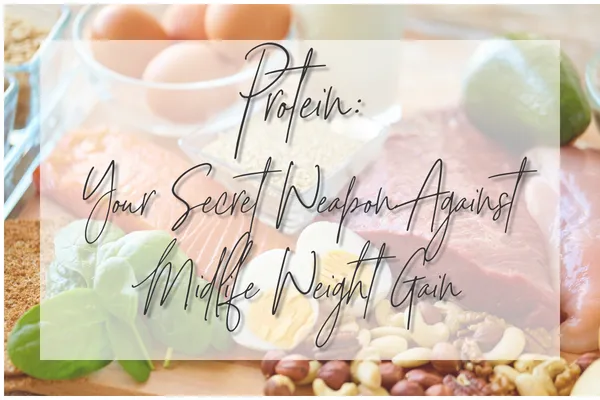BLOG

Protein: Your Secret Weapon Against Midlife Weight Gain
Navigating midlife brings its own set of challenges, especially when it comes to managing weight. Hormonal changes during perimenopause and menopause can often lead to unexpected weight gain, particularly around the belly, low energy levels, and a host of other symptoms. However, there's a powerful ally in your corner that you might not be fully leveraging: PROTEIN.
Why Protein is Crucial
Protein is not just a building block for muscles; it's a key player in metabolic health, appetite regulation, and weight management. Here's how it helps:
Supports Muscle Mass: As we age, we naturally lose muscle mass, which can slow down metabolism. Consuming adequate protein, combined with resistance training, can help preserve muscle mass, keeping your metabolism more robust.
Boosts Metabolism: Protein has a higher thermic effect than carbs or fats, meaning your body uses more energy to digest it. This can slightly boost the number of calories you burn throughout the day.
Increases Satiety: Protein helps you feel full longer, reducing the likelihood of overeating. This is crucial for managing weight, especially when hormonal fluctuations might be driving your hunger and fullness cues awry.
Stabilizes Blood Sugar: Protein has minimal impact on blood sugar levels. By balancing your meals with adequate protein, you can avoid the blood sugar spikes and crashes that may lead to increased hunger and fat storage.
Simplicity in Nutrition: Building a Solid Foundation
The beauty of incorporating more protein into your diet lies in its simplicity. Unlike complex diet trends that often exacerbate hormonal fluctuations and stress levels, focusing on protein is about nourishing your body with what it genuinely needs. Here’s how to make protein a cornerstone of your nutrition:
Variety is Key: Include a range of protein sources in your diet, from lean meats and fish to plant-based options like legumes and tofu. This ensures you get a broad spectrum of essential amino acids.
Integrate Protein in Every Meal: Aim for a balanced plate with protein, healthy fats, fiber, and complex carbs. This combination supports steady energy levels and hormonal balance throughout the day.
Listen to Your Body: Pay attention to how different protein sources make you feel. Your body's response can guide you towards the foods that best support your health and weight management goals.
Moving Beyond Quick Fixes
While Keto and Intermittent Fasting are popular, they can sometimes act as mere band-aids on the larger issue of hormonal imbalance and metabolic changes during menopause. These approaches might work for some but can exacerbate symptoms for others by further unbalancing hormones. I have learned through A LOT of trial and error that these approaches simply are not necessary.
True, sustainable weight management in midlife is about more than just a quick fix. It's about building lasting habits that support your body's changing needs. A balanced diet rich in whole foods and adequate protein, regular physical activity, and mindful eating practices can collectively support weight management and overall well-being during this transition.
As an MD and integrative nutrition health coach passionate about women's health, I advocate for simplicity and sustainability in dietary changes. Protein is a critical component of a balanced diet that can help manage weight and support hormonal health during perimenopause and menopause. By focusing on nutrient-dense, whole foods and incorporating adequate protein, you can navigate the challenges of midlife with confidence and vitality.
all rights reserved EMBRACE WELLNESS 2023
